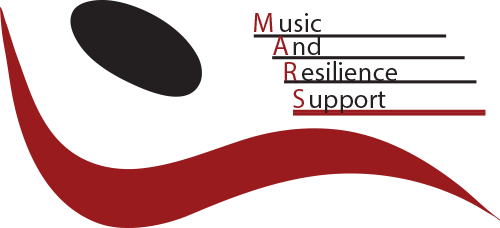Introduction
General objectives, theoretical underpinning, frameworks of thinking
The module aims to:
- refresh and reinforce knowledge and understanding of the concept of Community, its characteristics and needs;
- raise knowledge about the 'community-based' approach in target areas;
- increase knowledge about the issue of 'crisis', the importance of psychosocial support and the skills of service providers;
- expose the different models of psychosocial support, and the challenges and opportunities offered by each of these models.
Introduction to the module
Webinars
Towards critical engagement
- How is the observation of music-making with a target community able to help and inform our understanding of the dynamics inside this "community" ?
- Which aspects should be "warning" for us? How could music help us to move from a challenge we are facing, in order to create an opportunity?
- How can we deal with our own fears and anxiety while working inside an affected community? which human resources do we need and what support do we seek?
- What kind of information relevant to the community we are working is useful for us, in order to provide adequately?
- Are there priorities in the community to respond to before we organize our intervention; should these come first, and, if so, why?
Ice-breaker
Extracts from the Pilot Seminar's 1st session, where Henry Brown is facilitating musical engagement with the MARS students, a newly formed group, where noone knows anyone else.
This is followed by an excerpt of the group discussion on “What is psychosocial music support?”, led by Deborah Parker.
Assignments
This module focuses on two levels:
- the theoretical knowledge pertaining to the 'community-based' intervention model, from a psychosocial perspective, and the application of this model inside communities affected by war, conflicts, trauma, marginalization, isolation, deprivation, persecution, abuse, discrimination ...
- improving our aptitude to observe and report about the dynamics / symptoms seen inside a defined community, through the design of musical activities.
You are strongly recommended to work in groups: to generate and pool experiences and ideas amongst yourselves, and to develop group assignments.
These do not necessarily have to be written documents - feel free to be creative about your communication method (oral presentation, powerpoint, multimedial, text, etc...)
Assignment proposal 1: PS Intervention Models
Illustrate and review 2 different models of psychosocial intervention, comparing their 'strong' and 'weak' points.
How do these models inform our PS music work?
Assignment proposal 2: Health in relation to the PS framework
How can we relate health to psychosocial factors?
How does the psychosocial perspective change our view of 'health'?
How is 'music' involved (why is it important?)?
Assignment proposal 3: PS music case-study
Describe briefly a PS music activity you have implemented inside a community:
- Introduce the group (number, ethnicity, nationality, age, area...). Which methods did you use to get to know the community you were to work with?
- Which steps did you take to define the resources, needs and challenges of the community (mapping of existing services / networking with other actors ...)?
- What were your objectives and which methods did you use to reach these objectives?
- Which intervention model did you adopt and why?
- Was there any change in your original plan and if yes, why?
- How was the dynamic inside the group, and what, in your opinion, explains this dynamic?
- How did you evaluate the results?
- What was the impact of the intervention you made on a personal level (feelings of success, mistrust, need for support ...)
Resources
- Psychosocial Interventions - A handbook. International Federation of Red Cross and Red Crescent Societies
- Education in emergencies: providing quality education and psychosocial support to Palestine refugee students. UNRWA, 2015
- Mainstreaming Psychosocial Care and Support. Trainer’s Guide For Training Health Workers in Emergency Settings. REPSSI Psychosocial Wellbeing for all Children, 2010
- Psychosocial support in emergencies: critical for Syrian children. War Child Holland, 2013
- Assessment of mental health and psychosocial support services for Syrian refugees in Lebanon. UNHCR, 2013
- Disaster Risk Management for Health. Mental health and psychosocial support. WHO, 2011
- Culture, Context and the Mental Health and Psychosocial Wellbeing of Syrians. UNHCR, 2015
- Stress and Stress Management. Klinic Community Health Centre, 2010
- Foundation module 7 Psychosocial support. Action for the Rights of Children resource pack, 2009
- Psychosocial Care & Protection of Children in Emergencies. A Field Guide. Laura Arntson and Christine Knudsen. Save the Children, 2004

